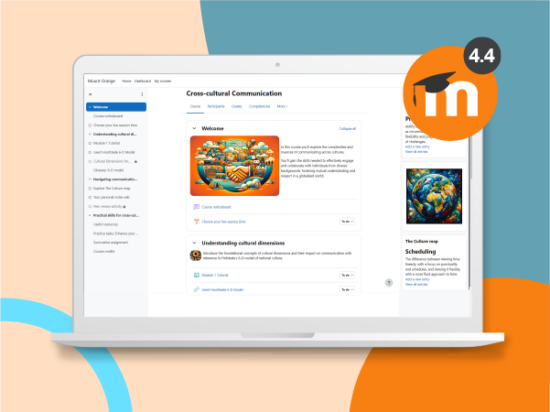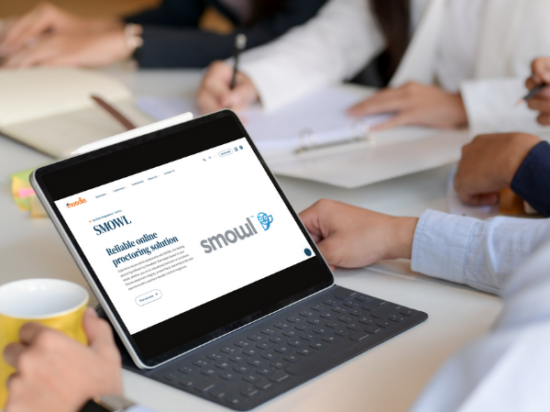Organisations face the pressing challenge that 44% of their employees’ skills will be expendable between 2023 and 2027, according to a report by the World Economic Forum. Rapid technological advancement is outpacing corporate adaptation, creating a high demand for AI and big data skills, which is expected to grow by 60%. Due to this trend, it is estimated that 6 out of 10 employees will need to undergo training by 2027. However, not everyone has access to sufficient training opportunities, which is where enterprise learning management systems (LMS) such as Moodle Workplace come in to equip organisations and their workforce for the future.
In this article, we will look at how implementing an enterprise LMS can be beneficial for your organisation. We will also discuss how Moodle Workplace can help you bridge the skill gap through its plugins and capabilities.
Key benefits of implementing an enterprise LMS
The global market for enterprise LMS is expected to grow from $8.1 billion in 2022 to $21.1 billion in 2027. This raises the question of what an enterprise LMS should offer to maximise its value. Most organisations want more than just a basic training tool; they need a system to create interactive and personalised learning spaces to boost employee productivity. Following the swift transition to online training during and after the COVID-19 pandemic, organisations demand an adaptable and scalable LMS solution.
An enterprise LMS should have the capability to integrate seamlessly with other software tools, such as various training modules, to foster a dynamic environment for upskilling. By seamlessly connecting with different learning resources, the LMS ensures that employees can engage in continuous learning directly within the platform. This includes the integration of external courses, allowing learners to conveniently access and complete additional training modules without navigating away from the centralised platform.
Reskilling and upskilling your workforce
Over the next decade, advancements in AI, machine learning, green technology, and pandemic-related changes are expected to significantly transform the job market, affecting 1.1 billion jobs. Without adequate reskilling and upskilling initiatives, businesses risk facing widening skill gaps among their workforce.
Upskilling involves acquiring new knowledge to enhance existing abilities, such as an IT technician gaining certifications for newly released software. Simultaneously, reskilling prepares employees for shifting roles, acknowledging that certain positions may become obsolete. For example, anticipating that there might be an AI-driven elimination of receptionist jobs, HR departments can proactively offer reskilling programs for employees’ transition into customer service specialist roles.
Implementing upskilling and reskilling programs through enterprise LMS provides employees with essential learning opportunities, addressing their aspirations for career growth and contributing to increased job satisfaction. This investment in employee development not only boosts productivity but also leads to improved business outcomes. Moreover, by preparing employees for upcoming changes, companies can avoid layoffs, voluntary departures, and declines in morale and productivity among the remaining staff.
Onboarding new employees
Enterprise LMS can improve the onboarding process by significantly reducing training-related costs, such as removing repetitive administration costs through one-to-one interactions, travel, accommodation, and in-person event expenses. It can enable new hires to independently navigate the onboarding process, decreasing the workload on senior employees and minimising the necessity for extensive face-to-face mentoring. This streamlined approach not only brings efficiency to onboarding but also allows for easy tracking and recording of course completion and performance. The tracking system’s analytics help organisations improve development programs.
Moreover, integrating an enterprise LMS with a Human Resources Information System (HRIS) adds another layer of efficiency to onboarding efforts. The seamless communication between the HRIS and the enterprise LMS facilitates personalised onboarding experiences by effortlessly transferring key information about the new employee. For instance, automations in the onboarding process can be leveraged when user information is pushed from HRIS to the LMS. This allows for dynamic adjustments based on specific details, such as the user’s department; for instance, newcomers in the Sales department can be automatically enrolled in the “Induction to Sales Department” course.
Simultaneously, the LMS communicates the employee’s onboarding activities and performance back to the HRIS. Whether prioritising the automation of user account creation or syncing changes to user status, this integration can enhance knowledge and skills efficiently.
Creating a centralised training ecosystem
An enterprise LMS can benefit employees by providing convenient access to learning materials, regardless of their location. With streamlined functionalities, it delivers timely updates on new content, ensuring employees stay up-to-date with their training progress. The system not only ensures efficient organisation and management of corporate learning materials but also simplifies content management, allowing for the targeted assignment of specific skills to employees based on their roles.
In addition to these benefits, integrating content libraries with the LMS helps teams stay updated and simplifies tracking and management within the organisation’s platform. In addition, by incorporating file repositories like Google Drive or Dropbox with the LMS, a central hub is created for storing, organising and sharing documents. This makes it easy for learners to access files directly from their personal accounts within the LMS, simplifying processes such as file submissions for assessment. The implementation of Single Sign-On (SSO) allows users to authenticate once and navigate between integrated systems without repeated logins.
Establishing engaging learning experiences for employees
By incorporating multimedia elements such as videos, simulations, and interactive quizzes, an enterprise LMS transforms traditional training into engaging experiences. The ability to offer real-time feedback and discussion forums within the platform enhances collaboration among learners. Furthermore, gamification features, like badges and leaderboards, add an element of fun and competition, motivating employees to actively participate in their learning journey.
An enterprise LMS excels in providing personalised learning experiences tailored to learners’ needs. Through user profiling and tracking capabilities, the system can gain valuable data about their learning preferences, progress, and areas of strength or improvement. This data empowers the LMS to recommend targeted content, suggest relevant courses, and adapt the learning path based on each learner’s pace and proficiency.
Bridge the skills gap in your organisation with Moodle Workplace
Moodle Workplace serves as an effective tool for organisations aiming to bridge skill gaps among their employees. It is built upon Moodle’s strong foundation in pedagogy and social constructionism and includes all the secure and feature-rich attributes of Moodle LMS. It provides various means for learners to engage with course materials, allowing them to access content through multiple channels.
Moodle Workplace comes with functionalities designed explicitly for workplace learning, such as automation, custom reports, programs, and multi-tenancy architecture.
The dynamic rules feature facilitates the creation of simple conditional statements, known as rules, which can be triggered by status changes or events. For example, when enrolled in a course, dynamic rules can prompt employees to complete training, with certification provided upon completion. They can easily track their own progress and stay informed about expiration, recertification, and due dates through their Workplace dashboard.
Conclusion
An enterprise LMS provides a centralised platform for creating and managing diverse learning programs, facilitating targeted skill development. The features of platforms like Moodle Workplace, with its automated rules and streamlined curriculum distribution, offer a practical solution for efficiently identifying and addressing skills gaps. Moreover, the emphasis on workplace-specific functionalities, such as automation and multi-tenancy architecture, demonstrates the adaptability of modern LMS in aligning with the unique learning needs of organisations. Investing in a well-designed enterprise LMS not only supports ongoing employee development but also ensures that organisations are equipped to navigate the evolving landscape of skills and knowledge in the contemporary workplace.



